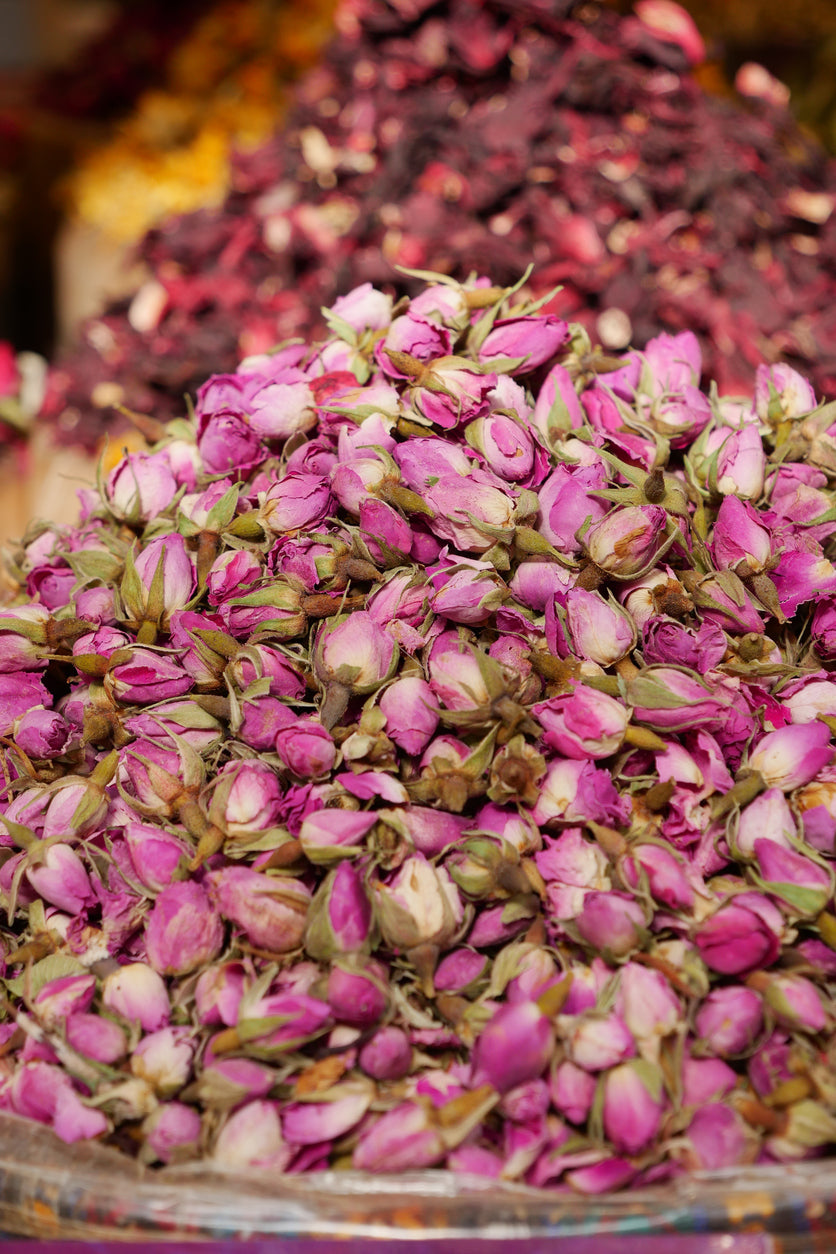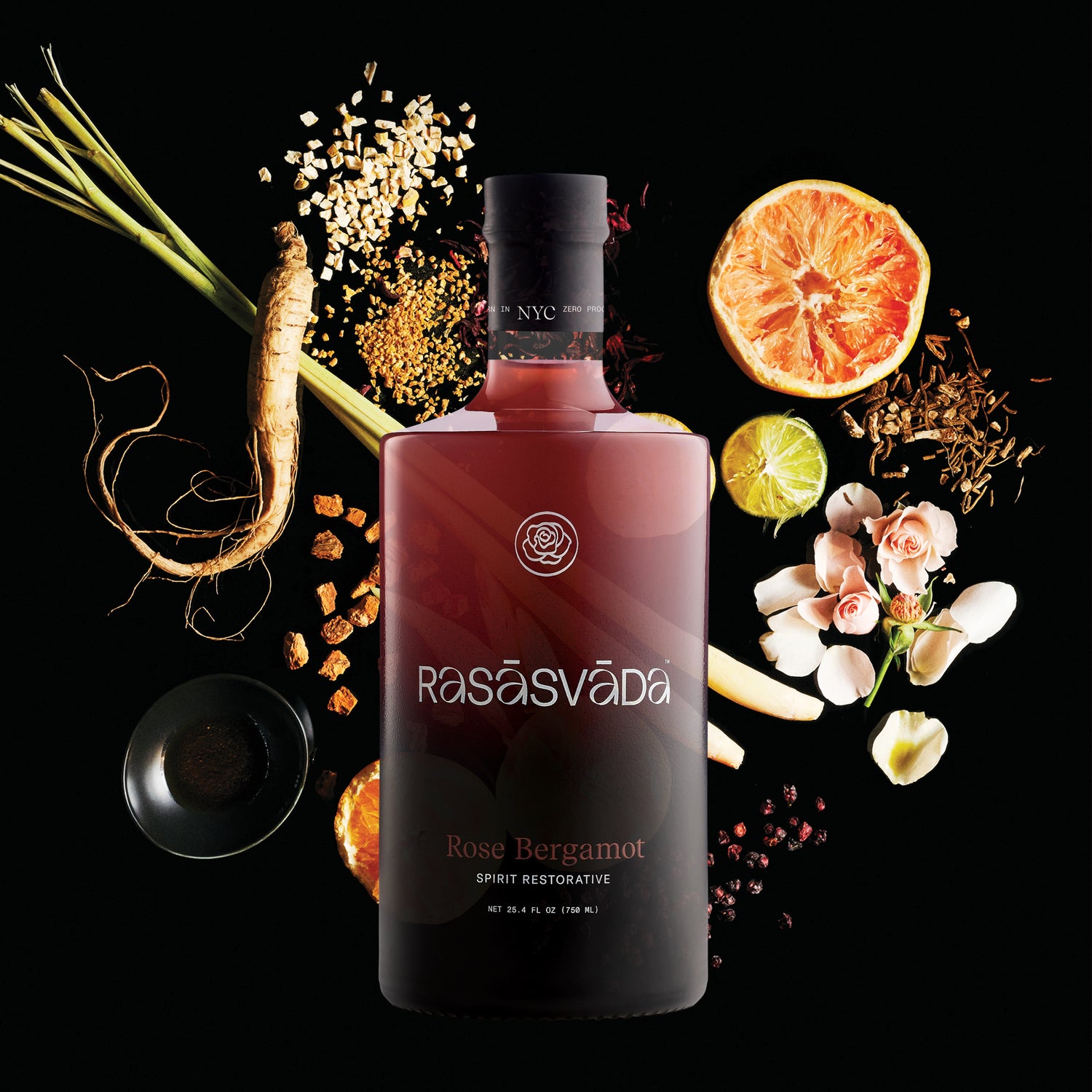Rose petals may be best known for their beauty and romantic symbolism, but for thousands of years, they’ve also been treasured for their medicinal properties and health benefits.
Rich in antioxidants called polyphenols, roses are used in Eastern medicine to soothe inflammation, ease digestion, and support overall vitality. Today, researchers are adding to the list, finding that rose petals may have other benefits too, including blood sugar control, metabolism, and mood.
Because of these unique benefits, rose petals are a key ingredient in Rasāsvāda’s Rose Bergamot—a restorative spirit that bridges ancient wisdom with modern science.
Read on to explore the rich history of roses and the five key health benefits of rose petals.
Botanical Overview
Botanical Name: Rosa
Family: Rosaceae
Common Names: Rosa canina, Rosa damascena, Dog Rose, Hundred-leaved Rose, Rose de Mai, Cabbage Rose, Provence Rose, Pale Rose, Rose, Red Rose Petals; Red Rose Buds and Petals
Location/Cultivation: Central Asia
Roses in Rose Bergamot

There are over 100 different families of roses, and within these families, there are even more species. In this blog, we will be focusing on the two different types of roses used in Rasāsvāda’s Rose Bergamot: the Moroccan pink rose, and Yunnan red roses.
Yunnan red roses: These roses grow wild in the Chinese province of Yunnan. They’re used in traditional Chinese medicine and also have culinary uses.
Moroccan pink roses: A hybrid rose that is thought to have originated in central Asia or Iran. It’s not found in the wild and is a crossbreed of Rosa x damascena.
History of Rose Petals
The roses that are in today’s gardens and bouquets are a little different from the ones that first grew over 35 million years ago (according to fossil evidence). But their symbolism across history and today remains the same. In ancient Rome, roses symbolized wealth and opulence as Romans planted large public gardens filled with roses. In Egypt, Cleopatra VII is said to have used rose-infused cosmetics and Egyptians bathed in perfumed rose water. And in the Middle East and China, roses were used too, for medicine, celebration, and as a symbol of beauty, luxury, and wealth.
Medicinally, Rosas have been used in Greek and Ayurvedic traditions to treat ailments such as stomach issues, blood sugar, pain, and chronic inflammatory diseases.
While wild roses originated in Central Asia, they were first cultivated in China roughly 5,000 years ago, and they continue to be a staple in Eastern medicine today.
Types of herbal medicines that use rose petals
Rose petals are rich in antioxidants and other compounds that make them beneficial for health, aiding everything from skin conditions to anxiety. Rose petals are also found in various formats, including:
- Tea
- Topical ointments
- Aromatherapy
- Extracts in beverages
At Rasāsvāda, whole rose petals are carefully cooked down in a process that helps preserve both flavor and the health benefits of the petals.

Health Benefits of Rose Petals
1. Anti-inflammatory benefits
You’re likely familiar with the term antioxidants— these are compounds found in plants and are also found naturally in your body. They help keep your cells healthy by fighting off damaging free radicals. There are a lot of different types of antioxidants, and it's important to get a variety in your diet. Rose petals are rich in antioxidants, specifically a type called ellagatannins, which are also found in pomegranates and raspberries.
Scientists have found that ellagatannins have important anti-inflammatory properties and can also help protect your cells' DNA from damage. This is key to helping prevent chronic conditions and maintaining a balanced immune system.
Researchers think rose petals may be a valuable source of important antioxidants, though they are still figuring out the best way to extract them.
2. Supports blood sugar
Between the rise of diabetes and the popularity of GLP-1s, maintaining healthy blood sugar levels is becoming commonplace health advice. A fiber and protein-rich diet can go a long way in promoting healthy blood sugar for those without health conditions. But those with certain health conditions may need an intervention beyond lifestyle changes.
Researchers are particularly interested in roses (Rose damascena) because they have been shown to impact blood sugar levels, according to animal studies. It works by blocking an enzyme called alpha-glucosidase, which breaks down starches into sugars (specifically glucose). When this enzyme is blocked by rose extract, less carbohydrate is broken down, lowering blood sugar levels. So far, these effects have only been seen in rats. More studies will need to be done to uncover rose extracts' full potential.
3. May ease PMS
From topical oils to teas to extracts, there are many ways to reap the benefits of rose plants. Aromatherapy is another common form of medicinal rose extract and scientists think it may be effective for helping ease pain brought on by menstruation. One study found that participants who used rose oil aromatherapy in addition to pain relievers (NSAIDs) had more pain relief than those who only took pain relievers. A second study had similar findings. Rose aromatherapy doesn’t replace standard treatment for menstrual pain, but for some, it may offer an additional way to help ease pain naturally.
4. Supports positive mood
Rose oil aromatherapy can be helpful for some people who are experiencing low mood, anxiety, or problems sleeping. Several studies have found that rose oil aromatherapy can have a positive effect on mood and stress levels. And the effects aren’t just mental-- one study even found that rose aromatherapy reduced physical signs of stress, including heart rate, blood pressure, and breathing rate. These promising results don’t mean that rose oil can replace other treatment options, but it can help complement other therapies and has minimal side effects.
5. Boosts skin health
Rose water, made from rose petals, is well-known for its cleansing, hydrating, and soothing abilities. Rose extracts also have skin-loving properties. Researchers have found that it may help reduce dark spots by blocking an enzyme responsible for making melanin. It can also help protect the skin from premature aging caused by sun exposure. This is thanks to its anti-inflammatory effects and its effect on certain enzymes that break down collagen.
Rose extracts are becoming increasingly popular in skincare products, and their use seems promising. Keep in mind that not everyone will experience equal benefits from rose extracts, and researchers are still working out the best way to formulate rose plant compounds so that they can be best absorbed by the skin.
Rose Petals in Rasāsvāda's Rose Bergamot Spirit Restorative

Rose Bergamot is a restorative drink that contains 15 botanicals, including rose petals and other rejuvenating plants like ginseng, schisandra berry, bergamot, hibiscus, and lemongrass. Rose Bergamot supports mental clarity, vitality and energy, stress management, and the immune system.
Part Used: Flower
Sourced from: China and Morocco
Taste/Energy: Mild, sweet, floral
How to drink: Enjoy it any time of day for a pick-me-up. Drink it daily for optimal benefits.
Sip it neat, mix it with sparkling water, or blend it into your daily drink—whether that’s a smoothie, wellness tonic, or cocktail.
Key Takeaways
Rose petals, from the Rosa genus, have been used for thousands of years in traditional Greek, Egyptian, and Ayurvedic medicine for their soothing and restorative properties. Beyond their beauty and fragrance, rose petals are rich in antioxidants that help balance inflammation, support healthy blood sugar, ease PMS, support a positive mood, and boost skin health.
FAQs
Sources
Heliyon | Beneficial medicinal effects and material applications of rose
Cosmetics | Unveiling the Biological Properties of Rosa rubiginosa L. Leaf Extract as a Bio-Functional Ingredient Based on 2D Cell-Based Models and In Vitro Assessments
100% plants. 0% preservatives.
